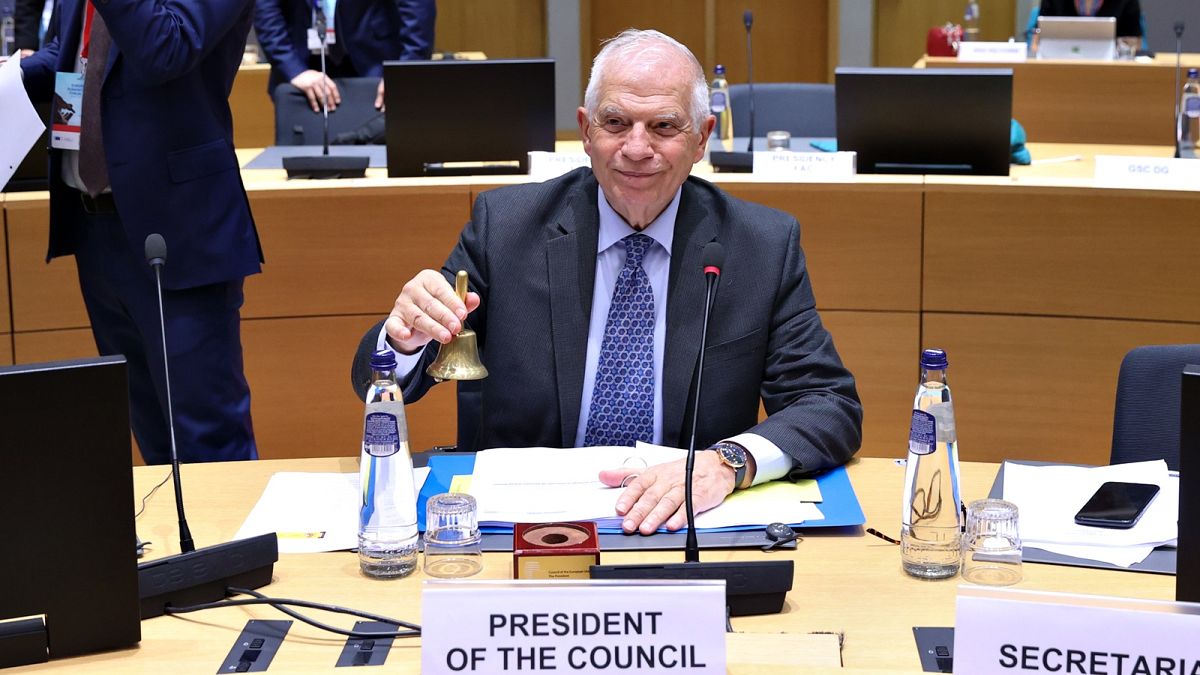EU reaches ‘political agreement’ to sanction extremist Israeli settlers, says Josep Borrell
After weeks of disagreements, the European Union has reached a “political agreement” to sanction extremist Israeli settlers, says Josep Borrell. The breakthrough occurred during a meeting of the bloc’s foreign affairs ministers on Monday, where the issue was put on the table to give diplomacy a new chance. “We discussed about the sanctions (on) Hamas. […]


After weeks of disagreements, the European Union has reached a “political agreement” to sanction extremist Israeli settlers, says Josep Borrell.
The breakthrough occurred during a meeting of the bloc’s foreign affairs ministers on Monday, where the issue was put on the table to give diplomacy a new chance.
“We discussed about the sanctions (on) Hamas. And we agreed on sanctions on extremist settlers. It was not possible last Foreign Affairs Council. This time has been possible. A solid compromise has been agreed at the working level and I hope this will continue until full adoption soon,” the bloc’s foreign policy chief announced at the end of the meeting. “But the political agreement is there.”
The sanctions have been in the works for months and were initially held up by a handful of countries, including Germany, the Czech Republic and Austria, who are among the bloc’s staunchest supporters of Israel.
But the devastation wrought across the Gaza Strip and the continued reports of violence perpetrated by Israeli nationals against Palestinians injected a sense of urgency into the talks, which further deepened after the United States, the United Kingdom and France went ahead and sanctioned a handful of extremist settlers.
The final roadblock was Hungary, which, according to diplomats, communicated last week that it would lift the opposition, raising hopes for a breakthrough on Monday.
The political agreement still requires a final adoption by ambassadors before entering into force. Settlements in the West Bank are illegal under international law and are considered a major obstacle to achieving a durable peace under the two-state solution.
The sanctions are “about specific people who have been identified as responsible for violent acts,” Borrell told reporters, confirming the restrictions will consist of a travel ban and the freezing of assets owned in EU territory. “What else can we do? We always sanction individuals and organisations in the same way.”
Asked about the names of the blacklisted settlers, Borrell added: “Like the Quixote would say, I don’t want to remember.”
The decision was part of a careful diplomatic choreography to coincide with fresh sanctions against Hamas, which the bloc considers a terrorist organisation.
In reaction to the attacks of 7 October, which killed over 1,100 civilians in Israel, the EU established a dedicated sanctions regime to target any individual or entity suspected of supporting, materially or financially, Hamas and the Palestinian Islamic Jihad (PIJ).
Six financiers were added to the blacklist on 19 January.
‘Open-air graveyard’
Monday’s meeting of foreign affairs ministers took place as the Integrated Food Security Phase Classification (IPC) released a new report showcasing the extreme gravity of the humanitarian crisis in Gaza, where more than 31,000 people have been killed since the start of the Israeli offensive.
According to the IPC, “the entire population in the Gaza Strip (2.23 million) is facing high levels of acute food insecurity,” with half the population under the category of catastrophe. In the northern section of the enclave, famine is “imminent.”
The military conflict, the scarcity of humanitarian aid and the limited access to food supplies, healthcare, water and sanitation are all factors behind the deterioration.
“The escalation of hostilities has caused widespread damage to assets and infrastructure indispensable to survival. About 50 percent of buildings – and more than 70 percent in the northern governorates – have been damaged or destroyed,” the report says.
Before heading into the meeting, Josep Borrell, the EU’s foreign policy chief, painted a grim picture of the situation on the ground.
“Gaza was before the war the greatest open-air prison. Today it is the greatest open-air graveyard. A graveyard for tens of thousands of people, and also a graveyard for many of the most important principles of humanitarian law,” Borrell told reporters.
Borrell also said he would propose a “political orientation debate” about the future of the EU-Israel Association Agreement, which has been in force since 2000. Last month, Spain and Ireland, two of the bloc’s most critical voices against Prime Minister Benjamin Netanyahu, joined forces and called for an “urgent review” of the agreement.
But during the ministerial meeting, at least six member states came against the review: Germany, Italy, Austria, the Czech Republic, Bulgaria and Hungary, several diplomats told Euronews, speaking on condition of anonymity.
Borrell admitted convening a formal Association Council with Israel would be “certainly complicated” and lacked “strong support.” A more practical idea would be to invite Israel’s foreign affairs minister, Israel Katz, to the next meeting in Brussels.
The invitation, Borrell added, should also be extended to the new prime minister of the Palestinian Authority, Mohammad Mustafa.
This article has been updated with more information.














